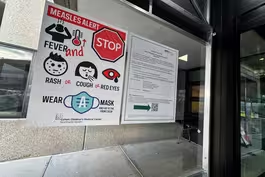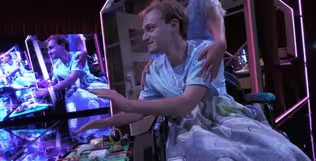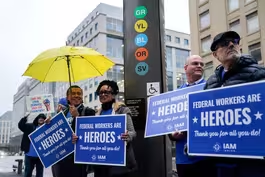
Agencies accused of rushing adoptions before moms backed out
Clip: 7/10/2025 | 8m 55sVideo has Closed Captions
Agencies accused of rushing adoptions before mothers can change their minds
As more states limit or ban access to abortion, some are beginning to push adoption as an alternative for women facing unplanned pregnancies. But when do laws go from accommodating to exploitative? From the Center for Investigative Reporting, Julia Lurie examines the consequences in one of the most adoption-friendly states in the country.
Problems playing video? | Closed Captioning Feedback
Problems playing video? | Closed Captioning Feedback
Major corporate funding for the PBS News Hour is provided by BDO, BNSF, Consumer Cellular, American Cruise Lines, and Raymond James. Funding for the PBS NewsHour Weekend is provided by...

Agencies accused of rushing adoptions before moms backed out
Clip: 7/10/2025 | 8m 55sVideo has Closed Captions
As more states limit or ban access to abortion, some are beginning to push adoption as an alternative for women facing unplanned pregnancies. But when do laws go from accommodating to exploitative? From the Center for Investigative Reporting, Julia Lurie examines the consequences in one of the most adoption-friendly states in the country.
Problems playing video? | Closed Captioning Feedback
How to Watch PBS News Hour
PBS News Hour is available to stream on pbs.org and the free PBS App, available on iPhone, Apple TV, Android TV, Android smartphones, Amazon Fire TV, Amazon Fire Tablet, Roku, Samsung Smart TV, and Vizio.
Providing Support for PBS.org
Learn Moreabout PBS online sponsorshipAMNA NAWAZ: As more states limit or ban access to abortion, some are beginning to push adoption as an alternative for women facing unplanned pregnancies.
But when do laws go from accommodating to exploitative?
From the Center for Investigative Reporting, Julia Lurie examines the consequences in one of the most adoption-friendly states in the country.
JULIA LURIE: Tia Goins and her partner Dominique Stanley (ph) recently welcomed a baby girl.
But it's their first child, Tiona, whose photos blanket their Detroit apartment.
TIA GOINS, Birth Mother: I kind of find myself, like, feeling like she's here, but she's not here, you know?
JULIA LURIE: After Goins gave birth in 2018, she was in crisis, facing eviction and unable to find room in a shelter.
TIA GOINS: Cold outside, had a whole 3-month-old baby.
Where do we possibly go?
JULIA LURIE: Desperate, she looked up adoption agencies and found Utah-based Brighter Adoptions.
SANDI QUICK, Owner, Founder and Director, Brighter Adoptions: Hi.
My name's Sandi Quick.
I am the owner, founder and director of Brighter Adoptions.
We are... JULIA LURIE: A representative for Brighter Adoptions offered to fly Goins from Michigan all the way to Utah and said that they would pay her cash after she gave up her child.
Online, Sandi Quick's agency, like many in Utah, offers housing and cash stipends targeting struggling expecting mothers across the country.
Quick has said that over 95 percent of her birth mothers come from out of state.
TIA GOINS: The lady just kept calling, kept calling, we're pushing for time.
This is what she wanted to do, she wanted to do.
So, in my head, it's like, OK, winter is coming around.
I don't want to be outside with her.
JULIA LURIE: Now facing homelessness, Goins and her 3-month-old baby on the same day they were evicted boarded a flight to Utah paid for by Brighter Adoptions.
MALINDA SEYMORE, Texas A&M University School of Law: The babies that adoptive parents most want to adopt are a rare commodity.
There's actually an acronym for it, AYAP, as young as possible.
JULIA LURIE: Malinda Seymore, a law professor at Texas A&M who studies adoption, estimates there are as many as two million hopeful adoptive parents competing for just 20,000 newborns every year.
MALINDA SEYMORE: Just moving her away from her support system is a great way to make a birth mother feel isolated and alone and helpless, all of which are a great mind-set for the adoption agency to get a consent form.
JULIA LURIE: Each state regulates adoption differently.
States like New York and California give birth mothers 30 days after signing adoption papers to reconsider their decision.
But states that are known as adoption-friendly like Utah expedite the process by, for example, making adoption irreversible as soon as the birth mother signs.
MALINDA SEYMORE: When states decide that they are going to be adoption-friendly, they're trying to make adoptions as quick as possible, as inexpensive as possible, as soon as possible.
JULIA LURIE: As a result of these laws, a cottage industry has emerged to fly in potential birth mothers to adoption-friendly states and charge a premium to adoptive parents.
STATE REP. CHRISTINE WATKINS (R-UT): There's a lot of money to be had in adoption.
And money can trump everything.
JULIA LURIE: Christine Watkins, a Utah state representative, tried and failed to pass adoption reform to protect birth parents.
So many people's understanding of adoption is, it's just this beautiful, benevolent thing.
And, of course, it can be that, but people don't necessarily think about it an industry.
STATE REP. CHRISTINE WATKINS: It is an industry, yes, basically because the state allows it.
We don't -- we don't have any laws that prohibit it.
JULIA LURIE: Over the past decade, dozens of states have introduced adoption-friendly legislation.
Georgia, Kentucky and Indiana have all shortened the period during which a birth mother can change her mind.
In Goins' case, things were moving fast.
Soon after landing in Utah, she met the people who wanted to adopt her daughter, a white couple from Mississippi.
But, immediately, she had second thoughts.
TIA GOINS: I text Sandi and told her, like, I'm kind of starting to change my mind a little bit.
This might not be something I want to do.
JULIA LURIE: But, the morning after Brighter Adoptions staff showed up at her hotel with the final paperwork.
TIA GOINS: It all was just happening so fast.
It's not something I wanted to do.
Why are they still wanting me to sign?
Then I'm like, if I don't do this, where am I going to end up?
JULIA LURIE: The forms waived her rights to protections in Michigan, where Goins would have had up to five days to change her mind.
TIA GOINS: So it was like, what do I do?
What do I do?
So, I just -- I just didn't want her to be homeless with me.
JULIA LURIE: Just two days after landing in Utah, Goins reluctantly signed her baby over to the adoptive parents.
TIA GOINS: I didn't really hold her.
I didn't really tell her goodbye.
I didn't kiss her.
They didn't gave me a chance to talk to her.
So they just came, just came and got her.
JULIA LURIE: On the way to the airport, Quick handed Goins $4,000 in cash.
Quick said the money was for Goins' future expenses, but Goins wasn't expecting that much.
And the whole process doesn't sit well with her.
TIA GOINS: A lot of people say it's like you sold your baby.
I did not sell my baby.
I think I took -- that people took advantage of me for my baby.
JULIA LURIE: Sandi Quick did not respond to multiple interview requests, but did send an e-mail saying the agency makes sure that birth mothers "fully understand the implications of adoption."
She added: "I am someone who ends up filling these gaps where our social safety nets fall short."
Now back home, Goins said she immediately regretted her decision, but Michigan officials could do nothing to help since the adoption was in Utah.
SUSAN DUSZA GUERRA LEKSANDER, Clinical Director, Pact: If she'd been able to slow things down, she'd probably still have her child with her.
JULIA LURIE: Susan Dusza Guerra Leksander is the clinical director at Pact, a California nonprofit that provides abortion, adoption, and parenting resources to pregnant women.
She says women in crisis become much more vulnerable in unfamiliar surroundings.
SUSAN DUSZA GUERRA LEKSANDER: The minute she said, I'm not sure that I want to do this, I'm not sure that I can do this, I mean, that should just call a full stop, full halt.
ASHLEY MITCHELL, Director, Knee to Knee: Domestic private infant adoption in America toes that line of legalized trafficking anyway.
It would be very easy to cross over that line.
JULIA LURIE: Ashley Mitchell is the director of Knee to Knee, which runs support groups for birth parents.
ASHLEY MITCHELL: Because the agencies are watching us, we try and be as quick and discreet as possible.
JULIA LURIE: Her family spends some Sundays at the apartment complexes in Utah, where adoption agencies house birth mothers, passing out leaflets to ensure that the women know their rights.
ASHLEY MITCHELL: We want them to know that they have the right to change their minds, that they have the right to go home if they want to go home.
I think we got them all.
The professionals that fly the women here 100 percent count on them not knowing what's available to them.
MALINDA SEYMORE: In confusion, there is profit.
If you can move a birth mother to a different state and take advantage of more favorable laws for your client, why wouldn't you?
JULIA LURIE: Seymore, an adoptive parent herself, emphasizes the good that adoption can do, if it's done ethically.
MALINDA SEYMORE: I'm not anti-adoption by any stretch of the imagination.
Adoption has a function to play for the benefit of children, and we are failing in that endeavor.
JULIA LURIE: She says Congress has done little to regulate adoption because it's been seen as a personal family matter, rather than as an industry.
MALINDA SEYMORE: If you classified adoption as commerce, then Congress would have the power to regulate it as it goes across state lines.
JULIA LURIE: Goins has not seen her daughter for more than six years, but she still regularly sends her packages.
She doesn't know if her daughter receives them, but she keeps a record of the gifts, so that, one day, her daughter will know she was thinking of her.
For "PBS News Hour" and the Center for Investigative Reporting, I'm Julia Lurie in Detroit.
Jan. 6 prosecutor says pardons send 'dangerous message'
Video has Closed Captions
Clip: 7/10/2025 | 7m 42s | LAW & JUSTICE (7m 42s)
Measles cases surge to highest levels in over 30 years
Video has Closed Captions
Clip: 7/10/2025 | 5m 39s | Measles cases surge to highest levels in over 30 years, CDC data shows (5m 39s)
News Wrap: Judge blocks order to end birthright citizenship
Video has Closed Captions
Clip: 7/10/2025 | 7m 10s | News Wrap: Federal judge blocks Trump order to end birthright citizenship (7m 10s)
Opera uses AI to give non-verbal people a voice
Video has Closed Captions
Clip: 7/10/2025 | 9m 20s | Opera uses AI to give people with non-verbal disabilities a voice (9m 20s)
Union says fight continues against federal employee firings
Video has Closed Captions
Clip: 7/10/2025 | 7m 1s | Federal workers union says it will continue to fight firings after Supreme Court ruling (7m 1s)
Why plans for a warning system fell apart in Kerr County
Video has Closed Captions
Clip: 7/10/2025 | 6m 12s | Plans for a flood warning system fell apart in Kerr County, leaving it vulnerable (6m 12s)
Providing Support for PBS.org
Learn Moreabout PBS online sponsorshipSupport for PBS provided by:
Major corporate funding for the PBS News Hour is provided by BDO, BNSF, Consumer Cellular, American Cruise Lines, and Raymond James. Funding for the PBS NewsHour Weekend is provided by...

















